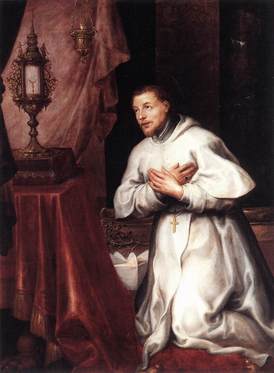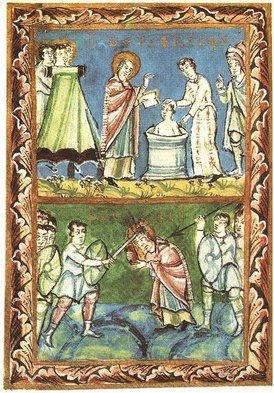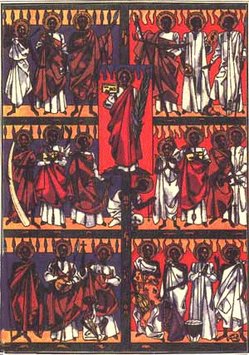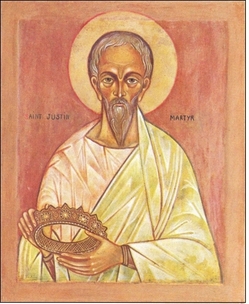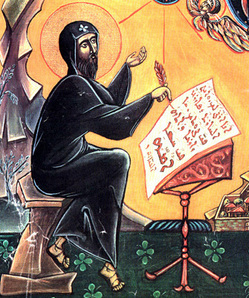 O God, Who has willed to enlighten Thy Church by the wondrous learning and excellent merits of the life of blessed Ephrem, Thy Confessor and Doctor: we humbly beseech Thee that by his intercession Thou may defend it by Thine everlasting power against the snares of error and wickedness.
O God, Who has willed to enlighten Thy Church by the wondrous learning and excellent merits of the life of blessed Ephrem, Thy Confessor and Doctor: we humbly beseech Thee that by his intercession Thou may defend it by Thine everlasting power against the snares of error and wickedness.
Category: Saints
Saint Norbert of Xanten
O God, Who did raise up blessed Norbert, Thy Confessor and Bishop, to be an illustrious preacher of Thy word, and through him did render Thy Church fruitful with a new offspring; grant we beseech Thee, that helped by his merits we may practice by Thy grace what he taught both by word and deed.
2009 is the 875th anniversary of the death of Saint Norbert of Xanten, the founder of the 12th century Order of Premontre (the Norbertines).
The Pope, on behalf of the Church, wishes “to give thanks to the Lord for the many gifts He has bestowed through the extraordinary evangelical witness and exemplary zeal of your Holy Founder, the Holy Father hopes that this happy occasion will inspire a renewed fidelity to the model of the first Christian community gathered around the Eucharist and persevering in prayer with Mary, the mother of Jesus. May each monastery of the Order experience an increase in faithful dedication to the Church, austerity of life, missionary zeal, and the spirit of hospitality so that each monastery will become even more a house of prayer and a school of faith.”
Saint Boniface
With the Church we pray:
O God, Who by the zeal of blessed Boniface, Thy Martyr and Bishop, did vouchsafe to call a multitude of people to the knowledge of Thy Name; mercifully grant that we who celebrate his festival may also enjoy his protection.
From a Letter by Saint Boniface
In her voyage across the ocean of this world, the church is like a great ship being pounded by the waves of life’s different stresses. Our duty is not to abandon ship but to keep her on her course. The ancient Father showed us how we should carry out this duty: Clement, Cornelius and many others in the city of Rome, Cyprian at Carthage, Athanasius at Alexandria. They all lived under emperors who were pagans; they all steered Christ’s ship -or rather his most dear spouse, the church. This they did by teaching and defending her, by their labors and sufferings, even to the shedding of blood.
I am terrified when I think of all this. “Fear and trembling came upon me and the darkness” of my sins “almost covered me.” I would gladly give up the task of guiding the church which I have accepted if I could find such an action warranted by the example of the Father or by Holy Scripture. Since this is the case, and since the truth can be assaulted but never defeated or falsified, with our tired mind let us turn to the words of Solomon: “Trust in the Lord with all your heart and do not rely on your own prudence. Think on him in all your ways, and he will guide your steps.” In another place he says: “The name of the Lord is an impregnable tower. The just man seeks refuge in it and he will be saved.”
Let us stand fast in what is right and prepare our souls for trial. Let us wait upon God’s strengthening aid and say to him: “O Lord, you have been our refuge in all generations.” Let us trust in him who has placed this burden upon us. What we ourselves cannot bear let us bear with the help of Christ. For he is all-powerful and he tells us: “My yoke is easy and my burden is light.”
Let us continue to fight on the day of the Lord. “The days of anguish and of tribulation” have overtaken us; if God so wills, “let us die for the holy laws of our fathers,” so that we may deserve to obtain an eternal inheritance with them.
Let us be neither dogs that do not bark nor silent onlookers nor paid servants who run away before the wolf. Instead let us be careful shepherds watching over Christ’s flock. Let us preach the whole of God’s plan to the powerful and to the humble, to rich and to the poor, to people of every rank and age, as far as God gives us the strength, in season and out of season, as Saint Gregory writes in his Book of Pastoral Instruction.
Saint Charles Lwanga & companions
The African martyrs add another page to the martyrology–the
Church’s role of honor–an occasion both of mourning and of joy. This is a page
worthy in every way to be added to the annals of that Africa of earlier times
which we, living in this era and being people of little faith, never expected
to be repeated.
In earlier times there occurred those famous deeds, so
moving to the spirit, of the martyrs of Scilli, of Carthage and of that “white
robed army” of Utica commemorated by Saint Augustine and Prudentius; of the
martyrs of Egypt so highly praised by Saint John Chrysostom and of the martyrs
of the Vandal persecution. Who would have thought that in our days we should
have witnessed events as heroic and glorious?
Who could have predicted to the famous African confessors
and martyrs such as Cyprian, Felicity, Perpetua and the greatest of all,
Augustine, that we would one day add the names so dear to us as Charles Lwanga
and Matthias Mulumba Lekemba and their twenty companions? Nor must we forget
those members of the Anglican Church who also died for the name of Christ.
These African martyrs herald the dawn of a new age. If only
the mind of man might be directed not toward persecutions and religious
conflicts but toward a rebirth of Christianity and civilization!
Africa has been washed by the blood of these latest martyrs,
the first of this new age (and, God willing, let them be the last, although
such a holocaust is precious indeed). Africa is reborn free and independent.
The infamous crime by which these young men were put to
death was so unspeakable and so expressive of the times. It shows us clearly
that a new people needs a moral foundation, needs new spiritual customs firmly
planted, to be handed down to posterirty. Symbolically, this crime also reveals
that a simple and rough way of life -enriched by many fine human qualities yet
enslaved by its own weakness and corruption–must give way to a more civilized
life wherein the higher expressions of the mind and better social conditions
prevail. (Pope Paul VI, homily at the canonization of St Charles, 1963)
Father, You have made the blood of the martyrs the seed of Christians. May the witness of Saint Charles and his companions and their loyalty to Christ in the face of torture inspire countless men and women to live the Christian faith.
Saint Justin martyr
The saints were seized and brought before the prefect of
Rome, whose name was Rusticus. As they stood before the judgment seat, Rusticus
the prefect said to Justin, “Above all, have faith in the gods and obey the
emperors.” Justin said, “We cannot be accused or condemned for obeying the
commands of Our Savior, Jesus Christ.”
Rusticus said, “What system of teaching do you profess?”
Justin said, “I have tried to learn about every system, but I have accepted the
true doctrines of the Christians, though these are not approved by those who
are held fast by error.” The prefect Rusticus said, “are those doctrines
approved by you, wretch that you are?” Justin said, “Yes, for I follow them
with their correct teaching.”
The prefect Rusticus said, “What sort of teaching is that?”
Justin said, “Worship the God of the Christians. We hold him to be from the
beginning the one creator and maker of the whole creation, of things seen and
things and unseen. We worship also the Lord Jesus Christ, the Son of God. He
was foretold by the prophets as the future herald of salvation for the human
race and the teacher of distinguished disciples. For myself, since I am a human
being, I consider that what I say is insignificant in comparison with his
infinite godhead. I acknowledge the existence of a prophetic power, for the one
I have just spoken of as the Son of God was the subject of prophecy. I know
that the prophets were inspired from above from when they spoke of his coming
among us.”
Rusticus said, “You are a Christian, then?” Justin said,
“Yes, I am a Christian.”
The prefect said to Justin, “You are called a learned man
and think you know what is true teaching. Listen. If you were scourged and
beheaded, are you convinced that you would go up to heaven?” Justin said, “I
hope that I shall enter God’s house if I suffer in that way. For I know that
God’s favor is stored up until the end of the whole world for all who have
lived good lives.”
The prefect Rusticus said, “Do you have an idea that you
will go up to heaven to receive some suitable rewards?” Justin said, “It is not
an idea that I have; it is something I know well and hold to be most certain.”
The prefect Rusticus said, “Now let us come to the point at issue, which is
necessary and urgent. Gather round then and with one accord offer sacrifice to
the gods.” Justin said, “No one who is right-thinking stoops from true worship
to false worship.”
The prefect Rusticus said, “If you do not do as you are
commanded you will be tortured without mercy.” Justin said,, “We hope to suffer
torment for the sake of Our Lord Jesus Christ, and so be saved. For this will
bring us salvation and confidence as we stand before the more terrible and
universal judgment seat of our Lord and Savior.” In the same way the other
martyrs said, “Do what you will. We are Christians; we do not offer sacrifice
to idols.”
The prefect Rusticus pronounced the sentence, saying, “Let those who have refused to sacrifice to the gods and obey the command of the emperor be scourged and led away to suffer away to suffer capital punishment according to the ruling of the laws.” Glorifying God, the holy martyrs went out to the accustomed place. They were beheaded and so fulfilled their witness of martyrdom in confessing their faith in their savior.
Saint Rita of Cascia
“Please let me suffer like You, Divine Savior,” was Saint Rita’s prayer.
Saint Rita of
Cascia (d. 1457) is the well-known saint and patron of the desperate, seemingly impossible causes
and situations. She assists Saint Jude and others before the Throne of Grace. The
reputation of Saint Rita is such because she had been involved in so many
stages of life as a – wife, mother, widow, and Augustinian nun, she buried her
family, helped bring peace to her city Unmbria in Italy, saw her dreams denied
and fulfilled – and never lost her faith in God, or her desire to be with Him. The
shrine where her relics are venerated in Cascia (Italy) is well-visited.
Holy Patroness
of those in need, Saint Rita, you were humble, pure and patient. Your pleadings
with your divine Spouse are irresistible, so please obtain for me from our
risen Jesus the request I make of you: (mention your petition). Be kind to me
for the greater glory of God, and I shall honor you and sing your praise
forever.
Glorious Saint Rita,
you miraculously participated in the sorrowful passion of our Lord Jesus
Christ. Obtain for me now the grace to suffer with resignation the troubles of
this life, and protect me in all my needs. Amen.
Visit the National Shrine of Saint Rita of Cascia
Blessed Franz Jägerstätter
Just as the man
who thinks only of this world does everything possible to make life here easier
and better, so must we, too, who believe in the eternal kingdom, risk
everything in order to receive a great reward there. (Franz Jägerstätter)
Franz Jägerstätter
(1907-1943) married Franziska Schwaninger in 1936 and honeymooned in Rome
receiving a blessing from Pope Pius XI after which he maintained it was a
spiritual awakening. He was a daily communicant and a Secular Franciscan.
At the time of
his death at age 36, Blessed Jägerstätter left behind a widow and 3 small
daughters. Interestingly both his priest and his bishop urged him to give up
his conscientious objection, and join the army; his sacrifice was regarded as
folly by his neighbors. The chaplain who saw Jägerstätter to his death related
that Jägerstätter said, “I am completely bound in inner union with the Lord.”
Reflecting upon
the context of his life he said:
The situation in
which we Christians of Germany find ourselves today is much more bewildering
than that faced by the Christians of the early centuries at the time of their
bloodiest persecution … We are not dealing with a small matter, but the great
(apocalyptic) life and death struggle has already begun. Yet in the midst of it
there are many who still go on living their lives as though nothing had changed
… That we Catholics must make ourselves told of the worst and most dangerous
anti-Christian power that has ever existed is something that I cannot and never
will believe … Many actually believe quite simply that things have to be the
way they are. If this should happen to mean that they are obliged to commit
injustice, then they believe that others are responsible. … I am convinced that
it is still best that I speak the truth even though it costs me my life. For
you will not find it written in any of the commandments of God or of the Church
that a man is obliged under pain of sin to take an oath committing him to obey
whatever might be commanded him by his secular ruler. We need no rifles or
pistols for our battle, but instead spiritual weapons, and the foremost of
these is prayer.
The Common for Martyrs: One Martyr in Easter Time
Read William
Diono’s First Things article, “Franz Jägerstätter: Martyr and Model”
For another essay on
Blessed Franz Jägerstätter read…
His biography,
In Solitary Witness, can be purchased from Amazon
Erna Putz’ biography, Franz Jägerstätter-Martyr: A Shining Example in Dark Times can be read here
The Houston
Catholic Worker’s article on the witness of Blessed Franz Jägerstätter
Franz Jägerstätter: Letters and Writings from Prison (Orbis Books, 2009).
Saint Isidore
 Well done, good and faithful servant; because thou hast been faithful over a few things, I will place thee over many things, saith the Lord.
Well done, good and faithful servant; because thou hast been faithful over a few things, I will place thee over many things, saith the Lord.
O God, Who didst give Thy people blessed Isidore as a minister of eternal salvation, we beseech Thee; grant that we may deserve to have him as an intercessor in heaven, whom we had as a teacher of life on earth.
Saint Isidore was married to a religious woman named, Maria Torribia. She, too is a saint of the Church. The couple had one son who died unexpectedly as a child. After the son’s death Isidore and Maria vowed to live a life of perfect continence. We ought to remember that Isidore came from a family of saints.
It is known that Isidore frequented Mass every morning making him late to work, which likely made his employer a bit annoyed, except that his work as a plowman was done by angels resulting in three times more productivity. His boss witnessed such miraculous events and accorded Isidore with great respect. Keep this info in the back your head next time you’re late to work due to attendance at Mass.
Saint Isidore loved the poor and the animals. The miracle of the multiplication of food occurred when he fed a flock of starving birds and at another time he shared his food with a large group of beggars.
Isidore died on May 15, 1120 at 60 years of age and was canonized in 1622 along with four very notable Spanish saints. The joke at the time of his canonization was that there were four Spaniards and a saint. The famous group was Saints Ignatius of Loyola, Teresa of Avila, Francis Xavier, Phillip Neri, and Isidore. His body has been found incorrupt.
A biography on our bishop and doctor saint.
Saint Matthias
 You have not chosen me; I have chosen you. Go and bear fruit that will last, alleluia.
You have not chosen me; I have chosen you. Go and bear fruit that will last, alleluia.
Saint Isaiah
 With a great voice like that of a trumpet,
With a great voice like that of a trumpet,
You proclaimed the coming of Christ to the world.
You were revealed as a swiftly-writing scribe of the things to come;
Therefore, we acclaim you with hymns,
Most illustrious prophet Isaiah. (Troparion, Tone 4)
Endowed with the gift of prophecy,
Prophet-martyr Isaiah, herald of God,
You made clear to all the incarnation of Christ
By proclaiming with a great voice:
“Behold, the Virgin shall conceive in her womb.” (Kontakion, Tone 2)
